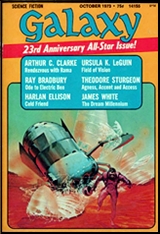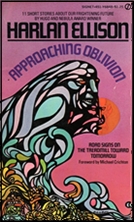Mon 28 Feb 2022
SF Stories I’m Reading: HARLAN ELLISON “Cold Friend.â€
Posted by Steve under Science Fiction & Fantasy , Stories I'm Reading[6] Comments

HARLAN ELLISON “Cold Friend.†First published in Galaxy SF, October 1973. Reprinted in The Best from Galaxy, Volume II, edited anonymously by Ejler Jakobsson. Collected in Approaching Oblivion: Road Signs on the Treadmill Toward Tomorrow (Walker, hardcover, 1974).
A man who has died on cancer wakes up and finds that except for a chunk of land surrounding the hospital in Hanover, New Hampshire, perhaps only three blocks in radius, the rest of the world has disappeared. Electricity is still on, and food is always stocked in the stores. At the edge of his world, things dangle from underneath, cables, water linesand the like.
He is the only one there, except at first strange barbarians from all eras from Earth’s past, who ride through then vanish over the edge. Until, finally, a young girl from Boston shows up. She is very pale and is wearing only a translucent dress. She is also very cold to the touch. She claims to have been responsible for the situation they are in, but Eugene Harrison (that’s his name), is not so sure.

There is a little more to the story, but not a lot. (I have glossed over the finer details.) Readers who want solid endings to their reading matter may not like this one, but it’s told in such a way, — as if Eugene Harrison is telling us his story in words an ordinary person would use (or if Harlan Ellison, in proxy, was leaving an audio recording for us to listen to) — you may not mind at all either.
PostScript: You may be able to discern from the cover of Galaxy SF above that this was a special issue, the 23rd Anniversary issue, with quite a few name authors in it. If I’d bought this issue from the newsstand, and I probably did, I might have been disappointed. One chunk of 50 pages is the first part of a serial by James White (“The Dream Millenniumâ€), and another chunk of almost 70 pages is the end of a serial by Arthur C. Clarke (“Rendezvous with Ramaâ€).
That’s 120 pages of a 180 page magazine. This leaves space for only a one page poem by Ray Bradbury, and three short stories. The other two are by Theodore Sturgeon and Ursula K. LeGuin. If you skip the serial installments, that’s not a lot of reading for 75 cents.
February 28th, 2022 at 9:03 pm
Not great Ellison, but a good example of his mastery of the form.
February 28th, 2022 at 9:13 pm
Not having time to sort out the wheat from the chaff in terms of recent SF/F, I have been trying to read some Best of the Year anthologies from the last 10 or so years.
This medium-ranked story by Ellison from almost 50 years ago makes stories I can’t finish second rate in comparison.
March 3rd, 2022 at 7:23 pm
Well, when the three short stories in a given issue are by Sturgeon, Le Guin and Ellison, this wasn’t the worst lineup possible–even if these are Not the first stories we think of from these writers, even from that period (“Slow Sculpture”, “The Day Before the Revolution” and “The Deathbird” would’ve made for a more impressive issue, perhaps–two of those were in GALAXY). A poem by Bradbury, even by 1973, was not too cheering, though. And I’d take a James White serial along with RAMA. But UPD’s odd distribution might’ve made overlapping serials even worse than a single one.
March 3rd, 2022 at 7:46 pm
Agreed with most of your points, and maybe all of them. As far as the problem of overlapping serials goes, it was probably less of a problem then, for collectors like me who bought all of the issues straight from the newsstands every month, and stocked them away to read the serialized novels all at once, once all of the installments were on hand.
March 4th, 2022 at 10:45 am
My practice as well…though by 1978, when I began collecting new issues of various fiction magazines off the stands, GALAXY’s distribution was very spotty indeed. UPD, never Too robust (I don’t believe), falling apart by then.
March 4th, 2022 at 10:59 am
As I recall, where I was living at the time, I had a newsstand (Jimmy’s Smoke Shop) that carried all of the SF magazines almost without fail. But when they did, it really took some scrambling around to make sure I didn’t miss an issue.